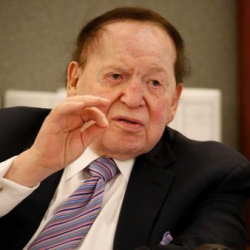
Adelson Said, “If somebody is going to chop my employees’ heads off, of course I would be interested.”
Sheldon Adelson was in a Las Vegas courtroom on Tuesday answering questions about his company’s Chinese operations. One of the questions involved his knowledge of a plot “to behead employees in Macau”. Other questions focused on broken promises from Chinese government officials about the Sands Corp’s Cotai Strip properties.
Adelson’s court appearance was due to a wrongful termination lawsuit by Steven Jacobs, the former Sands China Ltd. CEO. Jacobs claims he was fired from his position after he refused to engage in corrupt acts in his role as Sands China chief.
Disputes with Chinese Officials
In his testimony on Tuesday, Sheldon Adelson was asked about a dispute with Chinese officials when the company tried to obtain permits for an apartment high-rise in Macau. When James Pisanelli, Jacobs’s attorney, asked Adelson about broken commitments by Chinese officials, the Las Vegas Sands chairman said, “I want to rephrase. It was a misunderstanding. We thought it was condos. They thought, I’m not sure, that it was apartments rented out like hotels.”
Cheung Chi-tai
When Pisanelli asked a question a few minutes later about his dealings with Hong Kong businessman Cheung Chi-tai, the Las Vegas gaming executive asked to block the question, because it was inappropriate. Adelson said, “Your honor, Mr. Pisanelli is making erroneus–intentional, but erroneus–statements that we were doing business Chung Chi-tai. We were not doing business with Chung Chi-tai. Therefore, the question is completely inappropriate.”
Mr. Cheung was an investor in a publicly-traded company which arranged junket gambling tours in Macau. Cheung was identified by the US Senate in 1992 as a high-ranking gang figure. Also, a Hong Kong appeals court listed Cheung as an organized crime leader who ordered the death of a Sands Macau casino dealer. The Hong Kong court listed Cheung in that case in 2011. Cheung was never charged in the case. Instead, one of his subordinates was charged with conspiracy to commit murder.
Junket Operators in Macau
Junket operators are a misunderstood part of the Macau gambling industry. Junket planners are used by Chinese high rollers to get around government restrictions on how much money they can carry into Macau. Chinese law assures only $3,000 per visit and $50,000 max for a year, but VIP high rollers want to gamble for a lot more money.
Because Macau casinos cannot sue Chinese citizens for gambling debts, casinos do not issue the IOUs known as “markers”, as they would in the United States. Instead, the junket operators loan money to those gamblers, paying the casinos up-front for the gaming bills. To collect money once those gamblers are back in China, they must use triad enforcers. Over time, the triads (organized crime syndicates) largely ran the junket trade to Macau.
Running Games in the Casinos
If such operations simply took gamblers to the front door of casinos, they might not present a complication for casino operators like the Las Vegas Sands Corp. But junket operators often run their own private VIP baccarat rooms inside Macau’s casinos. The junkets pay casinos a straight fee for the use of their facilities, then collect huge amount of revenues from the gaming. In this way, perhaps $200 billion per year is generated by the junket operators, while Macau’s casinos collected less than $45 billion in their peak years.
Because the junkets operate out of casinos like the Venetian Macau and Sands Macau, it is not outrageous to claim Cheung Chi-tai and Sands China were business partners. Yet Sheldon Adelson took great exception to that charge, because the two sides are not technically partnered on the venture.
Questions about Threatened Beheadings
The judge ignored Adelson’s complaint and instead focused on whether the executive, in his role controlling Las Vegas Sands Corp and Sands China, would know if a junket operator like Mr. Cheung had made a threat against an employee.
Adelson replied, “If somebody is going to chop my employees’ heads off, of course I would be interested. But he wasn’t.”
Adelson then returned to the topic which rankled him before, “And we weren’t doing business with him. It feeds their narrative of ‘only Adelson is involved in wrongdoing’, not Jacobs.”
Adelson: Four Days of Testimony
This was the fourth day of testimony for Sheldon Adelson, who strove throughout the questioning to present his company as being “extremely meticulous” in its dealings with U.S. and foreign regulatory agencies. Meanwhile, Jacobs is trying to present to the judge that his firing was orchestrated from Las Vegas, at the highest levels of the company.
Judge Gonzales is being asked to rule on whether she has jurisdiction to rule on matters which happened in China. One reason Jacobs’s lawyers want to present their client’s firing as a decision made in Las Vegas is because it strengthens the argument that this case should be decided in the United States, where the decision to fire Jacobs (presumably) happened.
